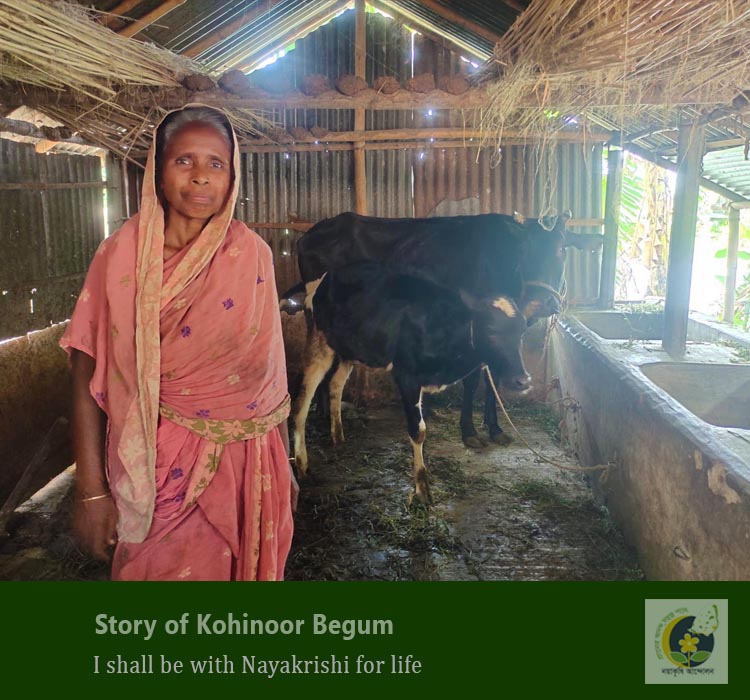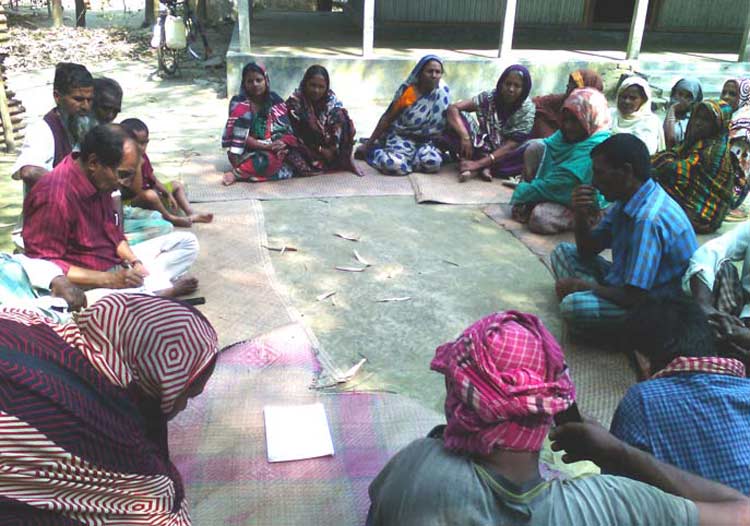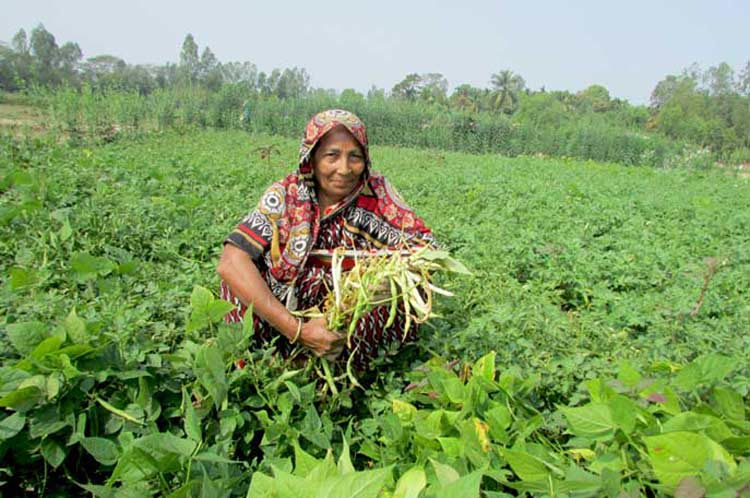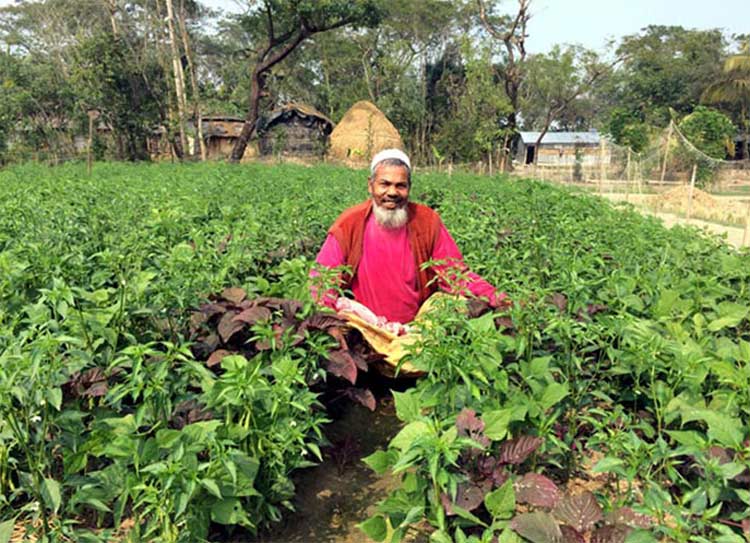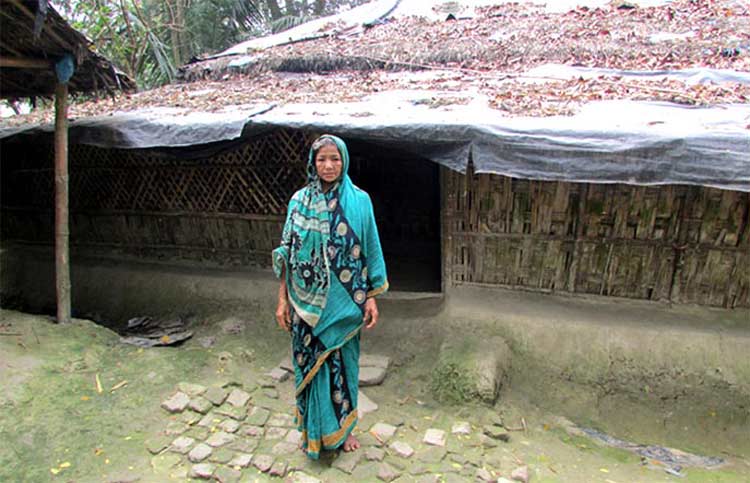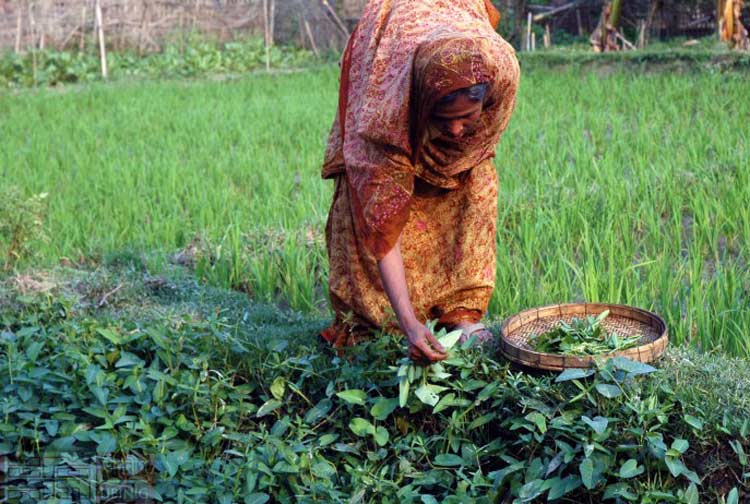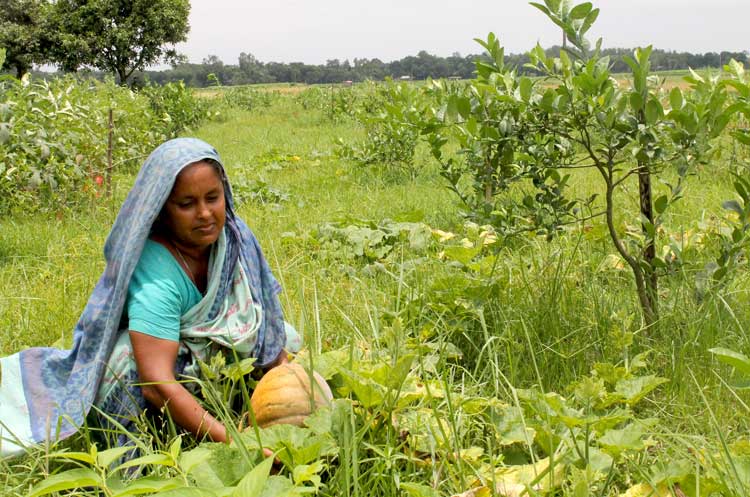Kohinoor Begum: Nayakrishi brings prosperity
Ajmira Khatun, Coordinator, UBINIG Arshinagar Biddaghor met a Nayakrishi farmer at Shyampur village, Dashuria union, Ishwardi upazila, district Pabna. Her name is Kohinoor Begum. She received Nayakrishi training and other support long ago. Ajmira went to the village to select farmers for Nayakrishi training. Kohinoor voluntarily approached Ajmira to talk about her relationship with Nayakrishi. She said “Whatever I have now is by virtue of Nayakrishi.” It was a time, when Nayakrishi was looking for landless female headed households for share rearing of livestock called Adhi.
Story of Kohinoor Begum
Ten years ago, I and my husband used to work for neighbors’ houses for earning income. We had no land of our own. I have two sons and a daughter. We used to pass our days with great hardship then. We passed many days with only one meal. Just at that time some kormies (staff) from Nayakrishi came to our village.
They noticed the pitiab (Read More)
Safe food production: Nayakrishi farmers’ perception
On 9th March, thirtytwo farmers, daimas, poultry keepers, students, women, vegetable traders of five villages of Atia Union of Delduar Upazilla in Tangail me in a meeting held in Nanduria village to discuss how to assess food safety of the crops they produce. They are very active farmers growing food crops without use of any chemical fertilizers and pesticides for over 20 years.
They grow various crops including cereals, pulses, vegetables, oil seeds and fruits. Cereals include rice, wheat, barley and maize; pulses such as black gram, grass pea, lentil and pea; oil seeds such as rye, mustard and sesame; vegetables including okra, amaranth, potato, sweet gourd, ash gourd, Indian spinach, spinach, tomato, snake gourd, sponge gourd, string bean, red amaranth, water gourd, common bean, arum, radish, cauliflower, cabbage, brinjal, papaya, and jute leaf. Farmers produce spices including onion, garlic, coriander, turmeric, ginger, radhuni, aniseed and chili; fruits mango, jackfruit, (Read More)
Farmers benefitted with seeds
Farmer Nur khatun in her Mix crop field, potato, French bean, Radish,Sweet gourd. Harvested French Bean
Emergency Support to Flood Affected People. Period: August December 2015; Supported By: Primate’s World Relief & Development Fund
Noor Khatun (55) wife of Yakub Ali (63), village Baderddan Kata, is a seed recipient after flood. She owns a family of four members including her husband and two sons. She has a homestead area of 40 decimals 60 decimals of cultivable land of her own in the field. This year she has cultivated an area of 140 decimals including her own 60 decimals and leased in 80 decimals. She has grown winter vegetables.
In addition to her crops in the field, she has also raised varieties of vegetables and fruits in the homestead area including common bean, water gourd, papaya, banana, plum, jackfruit, guava, coconut etc. Noor Khatun has livestock and poultry birds, cow, chicken, duck, (Read More)
Farmers received seed support after the flood
Mix Crop field. Chili, Amaranthas, Frech Bean in Krishnapur. Farmer Oziullah happy to see his yeild.
Emergency Support to Flood Affected People. Period: August December 2015; Supported By: Primate’s World Relief & Development Fund
Waziullah (60), village: Uttar Krishnapur, is a farmer. He is the head of a family of nine members including his wife, 4 sons and 3 daughters-in-Law. He owns a homestead of 60 decimals and cultivated land of 80 decimals. This year he has crops on 180 decimals including 80 decimals of leased in land and 80 decimals of his own land. He has grown Boro rice and vegetables.
In addition to raising crops in the field, he has also grown vegetables and fruits in the homestead including common bean, water gourd, papaya, banana, plum, mango, jackfruit, goat, chicken, duck, etc. reared in the homestead area.
Krishnapur village was inundated five times due to flood during June- (Read More)
Poor family receiving food support during flood
Jahanara Begum Krisnapur village received food support
Emergency Support to Flood Affected People. Period: August December 2015; Supported By: Primate’s World Relief & Development Fund
Jahanara Begum (52), is a poor widow of village Dakhin Krishnapur. Her husband died four years ago. Her eldest daughter was married recently. During the flood, she was living with one son and four daughters. The only earning member of the family was her son who is a daily wage worker. His income is too small to run the family. They pass their time with great hardship.
Under these circumstances, the flood during June-July, 2015 was a serious blow to their life and livelihood as they did not any savings to buy food. “Not a single house in the village was saved from the flood. There was flood for five times. Of these, there was water up to my roof top in two times. That time I took shelter in one of my relatives ho (Read More)
Nayakrishi is the key to peaceful life of Sakhina Khatun
Shakhina Khatun (42), wife of Abul Kahsem, Purba baro veula, Cox’sbazar is a landless farmer.
She has a homestead area of 10 decimals and shared in land 60 decimals. She has a dwelling house and a cattle shed. She has a bullock and a cow shared in. She also has five ducks and 18 chickens.
There are varieties of trees in the homestead area including mango, jackfruit, blackberry, amlocki, pomelo, dewa, banana, areca nut, coconut, mahogany, teak, sesbania, sisso, banyan tree, guava, star fruit. Medicinal plants occur in abundance including catagola, tiatui, bondherosh, pripata, bashak, hobupata.
The main source of income of Shakhina Khatun is farming. She works in the farm. Her husband and sons work in the farm. They work as wage labor in other’s farms. They also go for fishing when there is enough water in the canals, beels and rice fields. She shares in a bullock and a cow.
Shakhina Khatun has no cultivable land in the field. She farms in share (Read More)
Saira Khatun: a happy Nayakrishi farmer
Name: Ms. Saira Khatun, (50), wife of Mozaffar Ali, Datianakhalli, Chakaria, Cox’sbazar, a Nayakrishi farmer.
She has a home stead 20 decimals and cultivable land 95 decimals. Out of the cultivable land, 40 decimals covered by rice, 40 decimals salt production and 5 decimals under vegetables. There are three houses in the homestead area. The dwelling house is a tin-shed with bamboo fencing. There are also a kitchen, one. Cattle shed and one hen pen.
Farming is the main source of income of Saira Khatun. She does farming on her own. Her husband and son also work for farming. In addition to crop production, Saira Khatun also rears cow, goat, duck and hen. In this practice Saira Khatun earns a good sum of money at the end of the year. Her husband works as a wage earner in other field in addition to working on own field. As a result he earns some money for the family. Her son, Mozibor Rahman works for salt production in the dry season and go for fishing during the mon (Read More)
Local Rice Varieties Ensures Food and Feed Security
Ainal Hoque (42),Delduar, Tangail inherited 90 decimal land from his father. He has been living a happy life with two sons anda daughter.
His residence is on the bank of the Dhaleshwari river. The river water flows over his land in every rainy season. As a result there is regular siltation on land. Rabi crops grow well in the locality. Broadcast amon rice varieties including Chamardkigha, Hijaldisha, Laldhepa, Patishail, Patjag have been grown. The rice plants would grow about three feet tall before the entry of the flood water in the field in the rainy season. The plants would grow fast keeping pace with the rising flood water. There would be no loss of yield of rice due to flood. Rather it would increase yield by siltation on the base of the rice plants.
A few years ago, Majibor Rahman, a farmer in the village started boro rice production in the rabi season with irrigation. Following Mojibor Rahman, Aynal Hoque also started growing boro rice with irrigation.He used (Read More)
The Community Seed Wealth Center: Reducing risk and vulnerability of Marzina Begum
Marzina Begum (39) is a farmer, Bantial village of Sirajgonj district. She has seven members in the family with husband, a farmer; two daughters and three sons.
During flood in 2007 she had moved with her whole family in the Community Seed Wealth Center at Bantiar. This Seed Wealth Center was established by UBINIG, a private policy research organization in Bangladesh. The Seed Wealth Center is a common place for seed storage at community level.
Marzina moved along with her 5 kids, seeds, cows and goats. Their home is about 700 yards away from the Community Seed Wealth Center. Their homestead area went under water due to the flood.
Marjina narrated her plight. She mentioned that her husband had no work for last 15 days since the flood came. All means of livelihood were suspended. In the mean time they had sold a goat and two cocks for money to buy food. They had moved here 2 days ago for shelter and save their seeds.
They had carried here seeds including (Read More)
“Seed is my dream”, Nahar Begum
Nahar Begum (50), W/O - Mojibor Rahman, Village: Higanagar Barobari, Union: Attia, Upazila: Delduar, District: Tangail
My parents live in the same village. They have three acres of cultivable land. They have been farming on their own land I used to attend agricultural and other household activities with my parents so long I was with them before my marriage. My major involvements there included seed sowing, post harvest processing and storage of seeds. I also enjoyed rice husking with my mother.
After marriage I was happy to see the same set of agricultural environment in my husband’s residence. My husband has two acres of cultivable land. He cultivates his own land. I learnt the art of agriculture from my mother. Now I have been practicing the same with my mother-in-law. I am responsible for maintenance of seeds of different crops in addition to other household activities.
Now I have three daughters and three sons. My eldest son has got a job after complet (Read More)
Local varieties of rice are environment friendly
Alimuddin Sarker (45), son of Jasimuddin Sarker are living at Dewli, Tangail. He is a farmer,
He has one acre of land. There are five members in his family including two daughters and a son. In most of the years their crops in the field are inundated. They grow boro and amon rice every year. Amon rice is vulnerable to flooding by the Dhaleshwari river. Consequently they run short of food grains for six months. They apply chemical fertilizer, pesticides and other inputs with the expectation for a better harvest. But the crops in the amon rice raised with HYVs seeds are damaged by the flood in most of the years.
Under these circumstances, recently there was a meeting on Water and food security at the residence of Mr. Chand, Memebr, Dewli Union Parished. Jamal attended this meeting. The adverse impacts of chemical fertilizer and pesticides on soil, water, crops and environment were discussed. These topics appeared interesting to him. There were discussions as to how crops (Read More)
Community Seed Wealth Center and Gumat are disaster shelters
Mehinoor Khatun ( 33) is living in the village of Bantiar,Shahjadpur, Sirajgonj. She has two sons and a daughter. Her husband Sontesh Miah is a tuberculosis patient and can not do any work. They have 87 decimal of cultivable land. They also have one cow, two goats, six ducks and six hens.
She moved with two sons (9 and 6 year s) and a daughter (1) along with 3 species of seeds, one cow, two goats, six ducks and six chickens in Seeds center and Gumat (Cow shelter) during flood in 2007. This Seed wealth center and Gumat were established by UBINIG for sheltering flood affected people and livestock.
Mehinoor Begum said that the Seed wealth center and Gumat were of great help for them during flood. After recession of flood water they planted seeds that they had kept in the Seed center of UBINIG.
She said, “If we would not get the provision for keeping seeds in this Seed center it would not be possible to kept seeds in my own hand.
In that case we woul (Read More)
Kamola Rani Mondol, Struggling for water
Kamala Rani Mondol(34), Nallapara, Delduar, Tangail can only sign her name. She has five members in her family with husband (45), a farmer; a daughter (16); a son (13) and her octogenarian mother-in-law. Her children go to school. She owns seven-decimal homestead and eight decimal crop lands. A functional landless, the family sharecrops on 80 decimals of crop land.
She has tin-shed house. She raises two cows, two ducks and 15 fowls. Out of about 100 families in the village, 25 are Hindu who inhabits Dakhinpara (southern part) of Nallapara village. Only one of these Hindu families has a tube well. There is no ditch or pond around. There is a ditch about 1.5 kilometers away from the village. The ditch has water for about six months a year (during the rainy season).
“I have been practicing Nayakrishi (ecological farming) for the last seven years. We grow local varieties of vegetables without any chemicals. We maintain cow, duck and fowls,” says Kamala Rani, an (Read More)
Water-logging tolerant rice ensures food sovereignty of Shilpi Akter
Shilpi Akter is a marginal farmer. She lives at Dewli village, of Delduar upazila in Tangail district. She has a family of four members including her husband, Mobarak Hosain (45) and two daughters. They own 75 decimals of cultivable land.
They live in the lower Jamuna flood plain area. Flood and inundation are their natural companions. Shilpi Akter mentioned their fields are inundated for about six months. The land remains fallow in the rainy season in most of the years. In the rabi (winter) season they grow rabi crops including mustard, pulses, foxtail millet and vegetables.
Mobarak Hosain, husband of Shilpi Akter mentioned that even in the rainy season Chamara and Digha varieties of rice would grow luxuriantly. For last 8-10 years, after the introduction of IRRI rice the local varieties of rice have eroded. This year he attended a course of Nayakrishi Learning session, Mobarak Hosain mentioned. Cultivation without pesticides, chemical fertilizer, prepar (Read More)
Seed is our heart: Rina Begum
Rina Begum (38), Village: Mamudpur, Union: Atia, Upazila: Delduar, District: Tangail
They have two acres of cultivable land. They have been farming on their own land
Rina said, I used to attend agricultural and other household activities with my parents so long I was with them before my marriage with Mainuddin Miah. My major involvements there included seed sowing, post harvest processing and storage of seeds. I also enjoyed rice husking with my mother.
After marriage I was happy to see the same set of agricultural environment in my husband’s residence. My husband has two acres of cultivable land. He cultivates his own land. I learnt the art of agriculture from my mother.. I am responsible for maintenance of Nayakrishi Seed Hut seeds of different crops in addition to other household activities.
I have one daughter and one son. My son has got a job after completing his formal education.. My daughter also got job after completed her graduation.< (Read More)
